The sofa strategy. Of power and brutality
(B2) The relegation of Ursula von der Leyen to a sofa during her visit to Ankara to Recep Tayyip Erdogan, while Charles Michel was entitled to an armchair, is causing a stir. The comments fuse, often irrational. Let's try to figure it out...
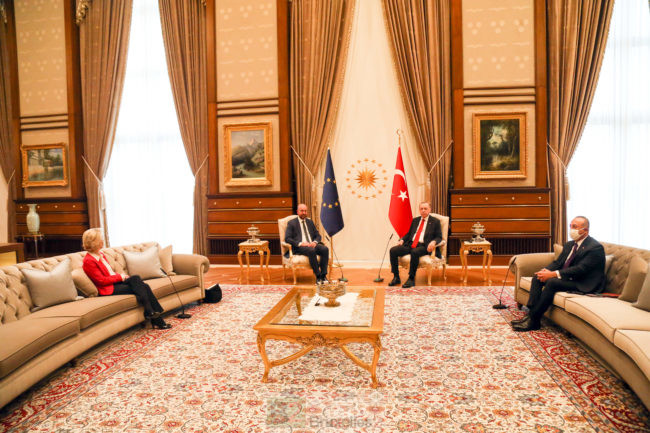
A brief reminder of the facts
European leaders (Charles Michel and Ursula von Leyen) were in Ankara on Tuesday (April 6) to convey to Recep Erdogan the message of the 27, ready to resume dialogue with Turkey under certain conditions (read: Turkey put to the test before positive steps. See you in June (Summit)). Three hours of intensive meetings, which lead to a communication minima (read : Small step for de-escalation with Turkey. Summit meeting in Ankara). However, the essential is quickly erased, at the end of the evening, by a video that creates a buzz.
We see the two Europeans and the Turkish leader enter a room. The two men settle on the two armchairs, flanked on either side by the European and Turkish flags. An honor. Some visitors are only entitled to two Turkish flags (see box). Ursula von der Leyen remains standing, and does not hide her surprise when she realizes that she is relegated to a secondary place. We hear him say "hum", without any of the male interlocutors reacting. In the following image, she is seated on a sofa, in the background, facing the Turkish foreign minister.
Scandal in the European bubble..." An affront to the President of the European Commission headline several newspapers (in the wake of AFP dispatches). Comments fuse on social networks and in the galleries of the newspapers. The fault is successively rejected on the Turkish leader, accused of having humiliated the woman (in the wake of the denunciation of the Istanbul convention). Then it is the President of the European Council, Charles Michel, who is targeted, treated as an odious macho. " Two men and a bassinet: macho scandal in Ankara headlines the Belgian daily Le Soir. We are in a phase of collective release. However, we must keep reason, and return to a certain sense of reality.
Protocol, an art
As a preliminary, it must be said that the protocol is an art, a science. It's a " real job “, confides to us a diplomat experienced in this exercise. The tempo of a visit, the place of each are calculated to the millimeter. Everything is planned – the routes, the vehicles, the light, the lighting, the room, the arrangement of the seats, their size…” A simple ascent of a step must be timed ". It is the same with the duration of the handshake and its vigor, which are the testimony of a great or small friendship.
Preparatory missions
Before any trip by a national (or European) authority, there is normally a preparatory mission. Even visiting the friendliest country requires this preparation. It may take two days. The more distant or unfriendly the country, the more preparations and preparatory missions it requires. Fix these details” takes days and days of tradings ".
A real balance of power
The local protocol will set certain conditions. And the protocol of the invited power to discuss them or require others. It's a " real balance of power ". Whoever has the most interest in the visit will have to give in, whoever is stronger can impose certain formalities. Each of the details will thus be discussed. Negotiations can sometimes be very hard ". Some countries, which have a millennial or imperial tradition, have the protocol pegged to the skin. Japan (where the duration of the rise of the steps is measured) or China for example, but also Turkey. The simple visit to the palace of Topkapi, in Istanbul, where the sultans thus received the ambassadors, is “ megaprotocolized ". The path, the bypass of the fountain, the pace of the walk, the stops, etc. Everything is thought out.
Was the protocol followed?
Who should sit next to Erdogan?
In the Turkish luminosity, only one person usually sits next to the 'monarch'. And even. Sometimes there is none (see box). Logically, it is normal for the President of the European Council, who represents the Heads of State and Government of the European Union, to sit down as equals with his Turkish host. And not the President of the European Commission who is 'only' head of the European executive.
Could there be two people on either side of Erdogan?
It would have been tricky. This meant that it was framed by Europe. A symbol that is too negative for Turkey, inaccurate in relation to the institutional and protocol reality. And far from the sought-after discussion between equals... Let us also add that the Europeans do not seem to have asked for this equality.
Why is Charles Michel sitting and not Ursula von der Leyen?
So it's not a question of sexism as some have said. It's just the rule of precedence, internal to Europe. In terms of external relations, it is the President of the European Council who fulfills this role. " The President of the European Council ensures, at his level and in his capacity, the external representation of the Union for matters relating to the common foreign and security policy, without prejudice to the powers of the High Representative of the Union for Foreign Affairs and security policy says Article 15 of the Treaty. And Charles Michel wants more than anything to assume this role. NB: in G20 meetings, where both figures are present, the President of the European Council thus takes precedence.
Doesn't the President of the Commission have an external role?
Yes, but not directly. It is the European Commission as a whole that has been granted this competence. " With the exception of the common foreign and security policy and other cases provided for in the Treaties, [the Commission] ensures the external representation of the Union ". The President of the Commission has, according to the treaty, only a role of orientation and organization of the European executive. He she " defines the orientations within the framework of which the Commission carries out its mission; decides on the internal organization of the Commission in order to ensure the coherence, efficiency and collegiality of its action; appoints vice-presidents (according to article 17 of the Treaty).
Why is the President of the European Commission only in second place?
Even if on the side of the European Commission, it is defended that the two personalities have the same protocol rank, this is not the institutional reality. In hierarchical terms, the President of the Commission proceeds (is elected) by decision of the European Council and the European Parliament. And not the reverse. He's basically a prime minister. In a dual system, with a President (in charge of external relations) and a Chief Executive, it is logical that the latter should be relegated to second place. In meetings of the European Council, for example, over the years the place of the President of the European Commission has varied. But it was not at the center of the image, always in 3rd or 4th position, even at the extreme (during international meetings).
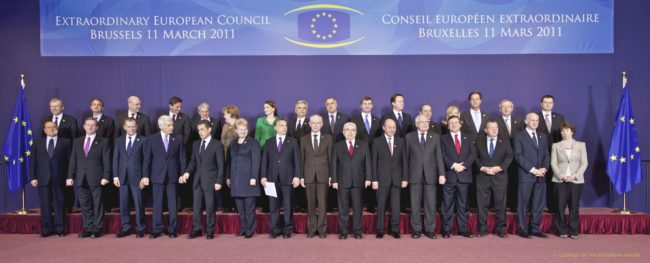
Whose fault is it ? What lesson can we draw for the future?
If we have to look for a culprit, it is not to be found in Ankara... but in Brussels.
Did Erdogan want to humiliate Europe? Erdogan does not support remonstrances on the respect of human rights. He believes that having done the 'job' on migration, Europe owes him a debt. By attacking Europe through its weak point, the plurality of its institutions, their complexity, the Turk may have wanted to mark a point, drive a wedge into a European structure of which he knows every corner. But maybe he wasn't the culprit... or the only one.
Did Erdogan want to humiliate the woman? The Turkish leader certainly has big flaws. But he has a certain political sense. When Angela Merkel was received by Erdogan, she was enthroned by his side in the seat where Charles Michel was. Note the small touch of the bouquet of flowers and the German flag behind the Chancellor.
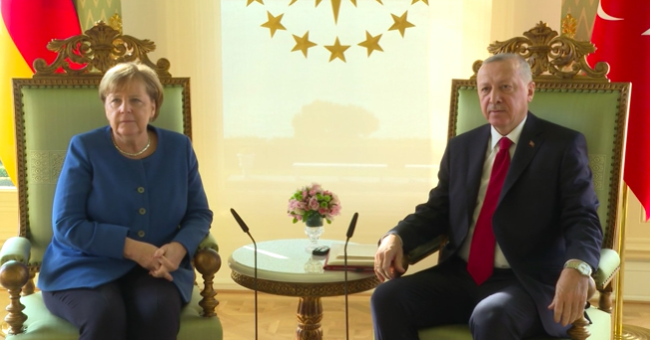
Ditto for Britain's Theresa May in January 2017. But without a bouquet of flowers or the British flag. There are two Turkish flags behind the two dignitaries. The atmosphere seems fresher...
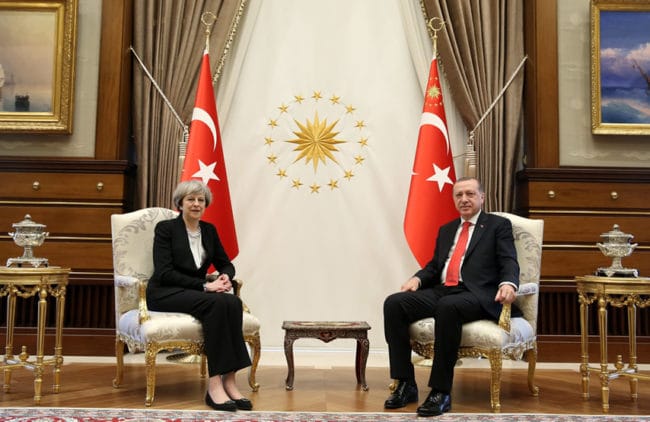
Who organized the visit? Apparently it was the council's protocol service that managed the visit. It was he who fixed certain details with the Turkish presidency. And, naturally, he favored his leader (Charles Michel) and institutional logic. There was no protocol team from the European Commission. Ursula von der Leyen having decided not to send any due to the pandemic. Afterwards, of course, we try to repair the damage. " If the room had been visited, we would have suggested to our hosts that, out of courtesy, the sofa be replaced by two armchairs for the President of the Commission “explains the protocol service of the Council.
Could we react at the time? Delicate. This kind of thing is prepared in advance. To upset established protocol is to risk a diplomatic incident. However, European and Turkish leaders were on a balancing act, trying to rebuild a complicated relationship, damaged by several past incidents. On the set of the Belgian continuous news channel LN24, Charles Michel explains that any reaction on his part could have created a " much more serious incident in view of the crucial importance of this meeting with the Turkish President. Same story, a little more bitter, however, at the Commission. " President von der Leyen was surprised. She decided to override and prioritize substance over protocol underlines the Commission's spokesperson, Eric Mamer. " But that doesn't mean she doesn't care about the incident. »
How to gauge Ursula von der Leyen's 'Hum'? Faced with this type of situation, it can be seen as the right answer. Although it is unclear whether the 'Hum' was intended for the Turkish leader or the European, or both. It can also be seen as a sign of a total lack of preparation, a certain lack of geopolitical manners. Finding out at the last moment that you don't have a seat is also quite confusing. Ordinarily, this type of visit is repeated or explained by protocol to the president. Or else it is wanting the incident. Exposing in broad daylight, in front of a foreign guest, internal divisions is rather negative. This could appear as a sign of additional fragility. (2)
Who is at fault? In this story, it is therefore not really Erdogan who is in question, but the Europeans. And their crippling lack of coordination. Admittedly, Charles Michel, with his interpersonal skills for international meetings, upsets the fragile European balance somewhat. He had been seen traveling the Mediterranean world on his arrival. We saw it in Georgia recently. Where despite all his efforts, he ran into a bone. The European Tintin loses feathers at each international meeting (Read also: When Tintin Michel goes for a walk, the European Council toasts). Between Ursula and Charles, moreover, the rag is burning. And, since the incident, they have not spoken to each other. The fact that the EU ambassador in Ankara was little associated with the visit also did not help.
A very European problem? There is a competition between the different European leaders who cannot clearly delimit their functions, all want to be in the photo, to be 'caliph instead of the caliph', as Iznogoud would say (1). This game, quite childish, is difficult to understand within Europe, and even more difficult to grasp outside. European leaders would do well to settle their internal problems and accept a common, clear, simple hierarchy, rather than exposing their divisions and internal quarrels.
The lesson to be learned? To visit an authoritarian ruler like Erdogan (or Putin) is to take a risk. A definite risk. Europe is no longer perceived today as a puny animal, a nice being to whom we owe respect. It can also be perceived in a hostile way. European leaders must not be naïve. Even very well prepared, they go down the funnel. A host who does not automatically respect all the common rules, will want to use this visit to his advantage. Josep Borrell's visit to Moscow proved it (read: Josep Borrell's trip to Moscow: legitimate, necessary, useful?). The risk of being trapped is not 2 or 3%. It is 100%! Europe is, in fact, faced with a " double phenomenon » analysis for B2 by an experienced diplomat: the European institutions « are more exposed than in their past (they are more present and we ask them for more). And there is " a brutalization of international power relations ". This " brutality of the geopolitical game Europe must better prepare and manage it in the future. " Everything needs to be locked down even more ».
(Nicolas Gros-Verheyde, with Leonor Hubaut)
- See Iznogoud by Rene Goscinny.
- NB: We would have preferred not a 'hum', a mark of a slightly out of place ego, but a sign on the unfavorable situation of human or women's rights in Turkey (even subliminally like a touch of color violet).
Return to the past of Turkish-European meetings
Is there a precedent with such a hierarchy?
Yes, when Erdogan receives Charles Michel and Josep Borrell in March 2020. Charles Michel is alongside the Head of State. And the High Representative of the EU for Foreign Affairs, Josep Borrell is relegated to the sofa. He does not make a chimera of it and appears all smiles in front. It is true that the roles were clearer, one being the representative of the Heads of State and Government, the other being the head of European diplomacy.
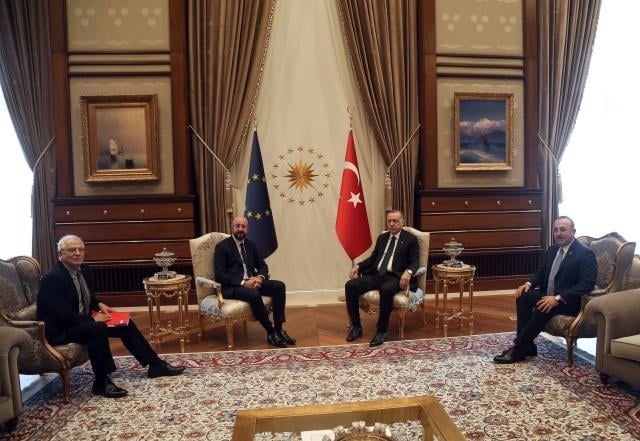
Another example. When Erdogan received in October 2015, in the midst of the migration crisis, the Vice-President of the European Commission, Frans Timmermans (in charge of Fundamental Rights at the time), seated to the right of the Turkish President, the other commissioners (J. Hahn in charge of Neighborhood, D. Avramapoulos in charge of Immigration)... are relegated to the sofa. To the left of the Turkish president sits his foreign minister, Feridun Sinirlioğlu. Turkey is thus playing two against one. And there is no gender issue. We are certainly faced with a lower level of representation: a simple vice-president of the Commission.

Are there reverse precedents? Yes. During a previous meeting, in May 2017, the two European representatives, at the time Jean-Claude Juncker (European Commission) and Donald Tusk (European Council) sat side by side with President Erdogan. This example is often put forward by the European Commission. But... we are then in Brussels. That's a big difference! The visit is organized by the European Union. On the photo, we note well who is in the center: Donald Tusk, the President of the European Council, as an inviting power. To his right the Turkish President, RT Erdogan, looking rather grumpy, and to his left, President Juncker (symmetrically to the Turkish President, seats slightly at an angle).
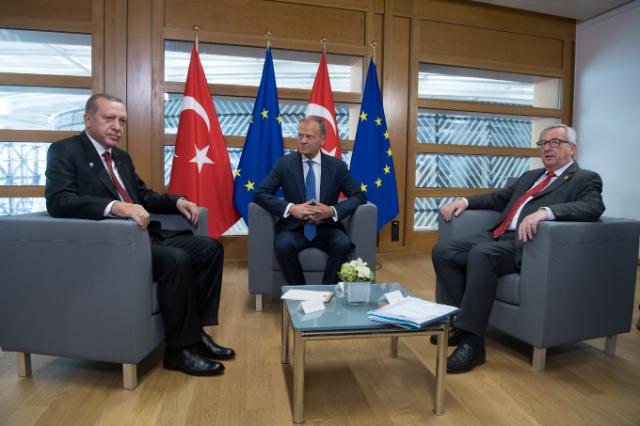
Another example, always with the same protagonists, in Antalya this time. The framework differs, it is a bilateral visit. It was on the sidelines of the G20, where Turkey was a powerful host. And, above all, it was November 2015, before the military coup that hardened both the regime and relations with the European Union.
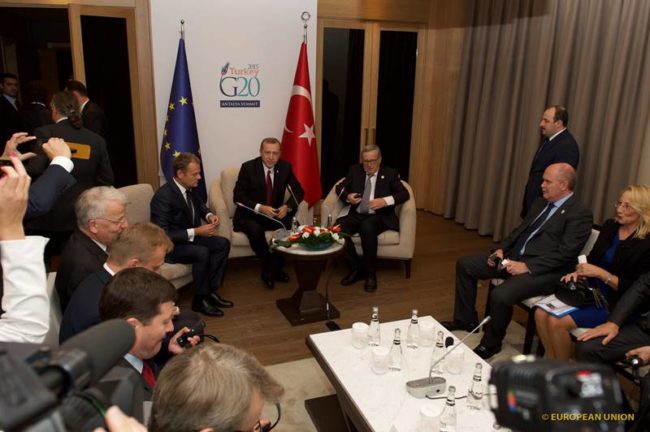
On the evolution of relations between Turkey and NATO
To illustrate the importance of seats, we can take another example. We remember the meeting between the Secretary General of NATO and the Turkish President, at NATO premises in Brussels, in March 2020. In the official photo, Jens Stoltenberg is brought back to the place of advisers, on a small, tight armchair. While the Turkish president sits in the middle, between two Turkish flags. No NATO flag is present, whereas it is often the rule in the enclosure of the Alliance.
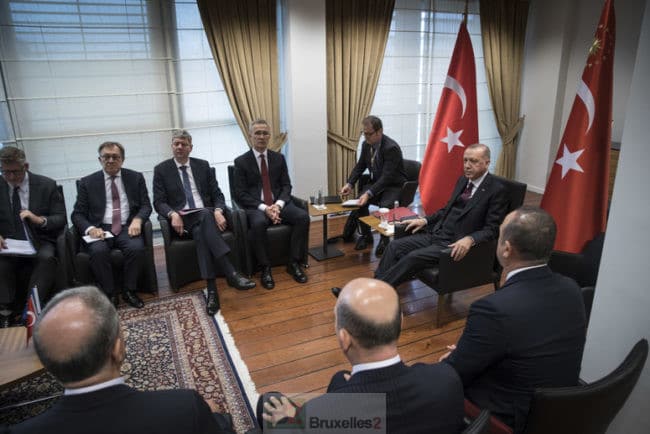
The difference is very notable with the meeting of the same, in September 2016, in Ankara, the day after the military coup. The Turkish president is always in the center, between two Turkish flags. But the secretary general is right next to him, in a somewhat subservient position. Everyone has their legs crossed, as a sign of relaxation. This difference in position is not innocent, four years apart. It reflects a lowering of relations.
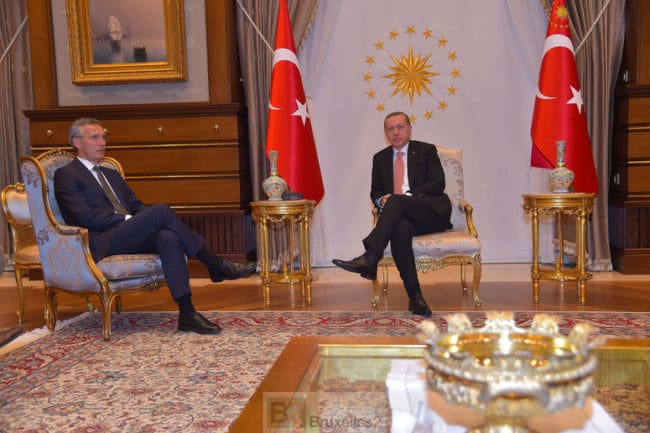
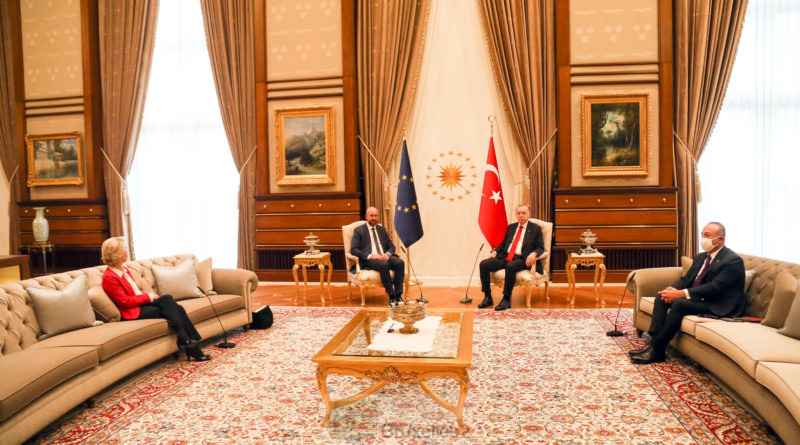
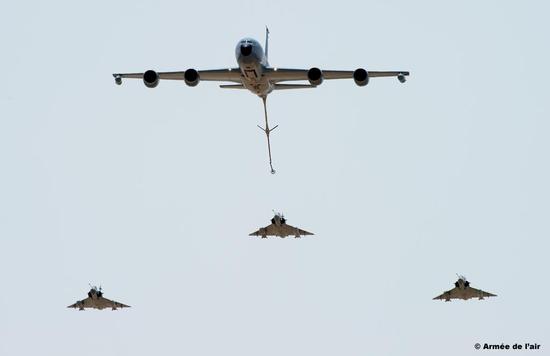
You are right, this polemic is unfair and ridiculous, or else it tells us something about the direction in which European officials want to move forward in terms of institutional architecture. Art. 15-6 TEU effectively gives precedence to the President of the European Council. If the President of the European Council had been a president, I'm not sure we would have made a big deal out of it. In short, VDL was put where it was needed as president of a “resource institution”. At the same time, we are so used to constitutional coups that the current ramdam no longer surprises me. In any event, it further tarnishes the image of an EU mired in societal quarrels.
Thank you, Nicolas, for analyzing this situation with all the professionalism that characterizes B2, and for not making it a sensational story, like the rest of the press, which lowers itself to the level of social networks. Von der Leyen was in her place on the sofa, because, any woman she was, she is "only" president of the European executive. President Michel committed no fault and acted (or rather did not act) with composure. The couch was the perfect seat, with enough space to hold von der Leyen's ego. I do not believe that this one served the cause of women on this occasion, no offense to feminists (who, moreover, lead a legitimate fight).
Very good analysis but the management of EU-Turkey relations is a permanent disaster which results in large part from the inability of the different components of the EU to hold a speech of firmness. As in Moscow with Borrell, these visits produce no other result than to serve the soup to the autocrats. We must make ourselves respected by limiting ourselves to technical contacts.
An unsatisfactory analysis. The good precedent is the photo of Tusk and Juncker's visit to Erdogan, where the two EU representatives were seated on opposite sides of their host, Erdogan. It is obviously the format of this meeting that the Commission should have in view. It is clear that Erdogan or his protocol service, often diplomats who invest their lack of power and influence in protocol shenanigans, who let Charles Michel's protocol take over, imbued with his vanity, all proportional to his lack of power real. Michel's role as Chairman of the Board is limited to managing the Board's agenda and representing him, within the framework of his role; which is purely ritual and lacks substance. We can therefore attribute the fault of the protocol oddity, and its anti-feminist repercussions, to the vain stupidity of Michel and his protocol service. Moreover, the rules of precedence established by the Treaties have little to do with rules or usages (infinitely elastic, contrary to what this analysis claims). But it remains true that Von der Leyen placed the whip in the hands of Michel and his services; lack of imagination?, overconfidence?, neglect of matters of ritual? In my opinion, we will not corner her a second time next to Michel. Which will carry this task in what remains of his mandate.